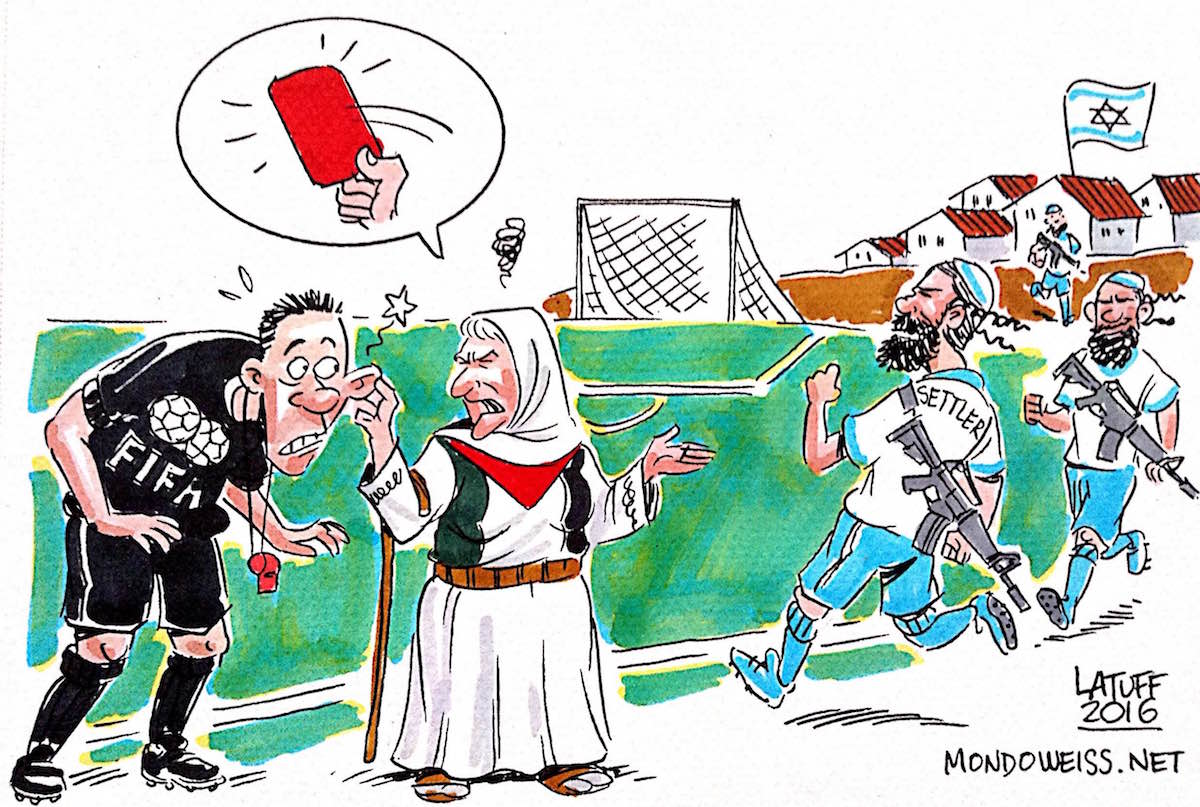Last month, Human Rights Watch released a damning report emphasizing that soccer’s governing body, Federation International du Football (FIFA), should render a decision on Israel Football Association (IFA) teams that are being played on occupied Palestinian land.

The teams in question, Beitar Givat Ze’ev, Beitar Ironi Ariel, Beitar Ironi Maale Adumim, Ironi Yehuda and Hapoel Bik’at Hayarden are all based in illegal settlements in the West Bank.
The regions are in territory that is being disputed by the Palestinian Football Association (PFA). The PFA argues that by playing teams in those regions, the IFA is violating FIFA rules that state that one member may not play games in the territory of another affiliated member without their approval. The PFA insists it does not want any matches played on Palestinian land. They point out that the IFA is using sport to legitimize the occupation and illegal settlements.
Sari Bashi, the Palestine/Israel Director at Human Rights Watch told me via email that this issue is crucial to regional politics and to sport. President Gianni Infantino is the leader of the world’s governing body of football and ought to resolve this as quickly as possible. “As part of his stated commitment to transparency and human rights, President Infantino should provide the public with a detailed update of the Council discussion,” she writes. “And a timeline for deciding whether FIFA will stop sponsoring matches on land that has been illegally seized from Palestinians.”
With findings collected by a monitoring committee that was assembled in 2015 and lead by South African FIFA member Tokyo Sexwale, FIFA was expected to render a decision whether to suspend or expel the six Israeli teams at at an executive meeting earlier this week. Following a decision, viable solutions would have been presented at the 2017 FIFA world congress to be held in Manama, Bahrain.
But in true FIFA form, the executive committee fouled and postponed their decision despite suggestions from special committee members, open letters from UN officials, and from academics and activists, an Avaaz.org petition that garnered over 150,000 signatures, the HRW report, and an on-going digital campaign that calls for justice in sport.
The oppression of Palestinian football by Israel is a hot-button issue for FIFA- which makes a profit from the matches and sponsorships of the IFA teams. While Israeli teams flourish, Palestinian football is hardly thriving due to a lack of resources, crumbling infrastructure, and unjust mobility restrictions on teams which Mondoweiss has previously reported.
Footballers are routinely the targets of detentions, arrests and shootings despite assurances from FIFA that they support the world’s game.
After FIFA dropped the ball on a decision, it is hard not to recall deposed ex-President Sepp Blatter’s inane remark that “football should never be used for political messages.”
Not so ironically, FIFA has consistently used football for political messages. Blatter was an avid supporter of an ill-conceived ‘peace-match’ to help ease tensions in the region between the two federations. FIFA may deny that sport can be a vehicle towards ensuring justice and uplifting the values it is supposed protect by claiming that football isn’t political.
But Bashi sees it differently. She doesn’t believe that FIFA is being asked to solve a political problem. It is being asked to fulfill the commitments it reaffirmed when it agreed to implement the UN Guiding Principles on Business and Human Rights throughout its activities, which are substantially commercial.
“The football industry is valued at approximately $33 billion annually. FIFA has a responsibility to ensure that its activities do not contribute to or benefit from serious violations of human rights and international humanitarian law (IHL). By sponsoring games on land that has been unlawfully seized from Palestinians and holding those games under conditions of discrimination, FIFA is violating its human rights responsibilities.” HRW maintains that Israeli settlements in the West Bank are inherently responsible for serious human rights violations, including restrictions on the freedom of movement of Palestinians, purportedly to protect them, discrimination against Palestinian construction and business activity to prop up the settlement industry and unlawful and discriminatory use of natural resources such as water, land and stone. FIFA is not being asked to solve the Israeli-Palestinian conflict. It is being asked to stop holding matches on stolen land while benefitting from the activity.
Moving forward, FIFA has assured that they will compile a report next month despite being unable to come to a decision because all members of the special committee were unable to meet. Both IFA and PFA have reacted to the news. During a press conference in Ramallah, PFA President Jibril Rajoub stated that if FIFA is not able to come to a decision quickly and help ease the “suffering of Palestinian sports”, PFA would approach the Court of Arbitration of Sport.
There is a precedent to sanction the IFA teams since European football’s governing body, Uefa, barred teams playing in Crimea from participating in Russia’s top football league after it annexed the country in 2014.
The IFA is strident and insists that it’s sole objective is to elevate the sport. Israel’s football executives often echo Blatter’s sentiments of not politicizing the sport.
The solution is to not prevent the IFA from playing the beautiful game, but to play within the legal borders of their country and not to use illegal settlements as a backdrop to elevate the sport. Legitimizing oppression by way of FIFA-sanctioned matches is unacceptable to players, officials and blemishes the sport itself.
Players, coaches and supporters should enjoy the world’s most popular sport while not being complicit in Human Rights or Football Law violations.
(Shireen Ahmed is a sports activist, a freelance writer and a public speaker who focuses on Muslim women, and the intersections of racism and misogyny in sports. When she isn't watching soccer, she drinks coffee as tool of resistance. She is currently working on her first book and lives in Toronto, Canada with her family. Twitter: @_shireenahmed_ Website www.shireenahmed.com.)
(Republished with permission from Mondoweiss.net).



